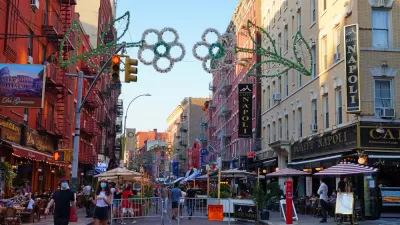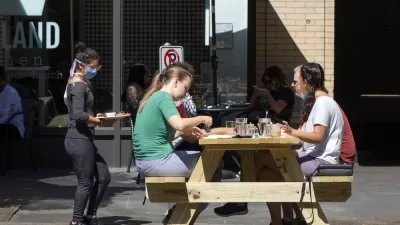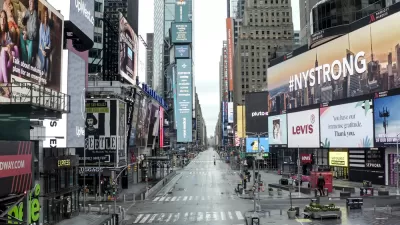Since the outbreak of the Covid-19 pandemic, there has been shortage of opinions on the coming evolution of cities. It’s time to check in with the debate.

“It takes a lot to kill a city,” says Mary Rowe, president and CEO of the Canadian Urban Institute, at the beginning of a recent Vox article that provides a roundtable discussion of experts on cities. The premise of the discussion: What is the future of cities, cutting through the culture war talking points and political propaganda that has dominated the discussion as the country emerges in fits and starts from the Covid-19 pandemic.
Here are the other experts cited in the article:
- Mary Rowe – “president and CEO of the Canadian Urban Institute”
- Richard Florida – “an urbanist and professor at the University of Toronto’s Rotman School of Management”
- Nicholas Bloom – “a Stanford economics professor who studies remote work”
- Emily Talen – “a professor of urbanism at the University of Chicago”
- Connor O’Brien – “Economic Innovation Group research associate”
- Ellen Dunham-Jones – “a professor and director of the urban design program at Georgia Tech’s architecture school”
- Esteban Rossi-Hansberg – “a professor in the University of Chicago’s economics department”
- Matthew Kahn – “an economics professor at the University of Southern California”
- Dror Poleg – “economic historian”
- Kenan Fikri – “research director at Economic Innovation Group”
- Arpit Gupta – “an associate professor of finance at NYU Stern”
For those keeping track at home, here are the number of times the article, between author and experts, mentions the following terms:
Climate: 3
Car(s): 1
Density: 1
Housing: 11
Transit: 5
Remote Work: 14
Covid: 2
Public Health: 0
Zoning: 1
Crime: 2
Pollution: 0
Air: 0
Water: 1
“Big cities — think New York City, Los Angeles, Chicago — will ultimately be okay, since a lot of what made them attractive in the first place is still there and impossible to find elsewhere. But that doesn’t mean they will — or can — stay the same,” writes post author Rani Molla to summarize the discussion.
“And while the move away from cities is overstated, even small shifts from powerhouses like NYC could represent windfalls for the suburbs, exurbs, and other cities those people choose to move to. That means smaller cities — like Cincinnati or Tulsa or Indianapolis — have a big opportunity to position themselves as destinations for those who do leave big cities, even as the largest urban areas are far from dying,” adds Rowe.
FULL STORY: The future of cities, according to the experts

Planetizen Federal Action Tracker
A weekly monitor of how Trump’s orders and actions are impacting planners and planning in America.

Map: Where Senate Republicans Want to Sell Your Public Lands
For public land advocates, the Senate Republicans’ proposal to sell millions of acres of public land in the West is “the biggest fight of their careers.”

Restaurant Patios Were a Pandemic Win — Why Were They so Hard to Keep?
Social distancing requirements and changes in travel patterns prompted cities to pilot new uses for street and sidewalk space. Then it got complicated.

Platform Pilsner: Vancouver Transit Agency Releases... a Beer?
TransLink will receive a portion of every sale of the four-pack.

Toronto Weighs Cheaper Transit, Parking Hikes for Major Events
Special event rates would take effect during large festivals, sports games and concerts to ‘discourage driving, manage congestion and free up space for transit.”

Berlin to Consider Car-Free Zone Larger Than Manhattan
The area bound by the 22-mile Ringbahn would still allow 12 uses of a private automobile per year per person, and several other exemptions.
Urban Design for Planners 1: Software Tools
This six-course series explores essential urban design concepts using open source software and equips planners with the tools they need to participate fully in the urban design process.
Planning for Universal Design
Learn the tools for implementing Universal Design in planning regulations.
Heyer Gruel & Associates PA
JM Goldson LLC
Custer County Colorado
City of Camden Redevelopment Agency
City of Astoria
Transportation Research & Education Center (TREC) at Portland State University
Camden Redevelopment Agency
City of Claremont
Municipality of Princeton (NJ)





























